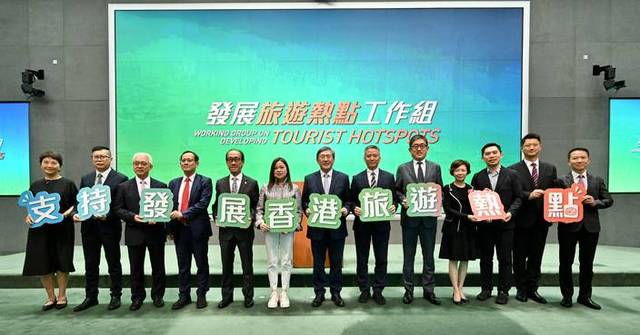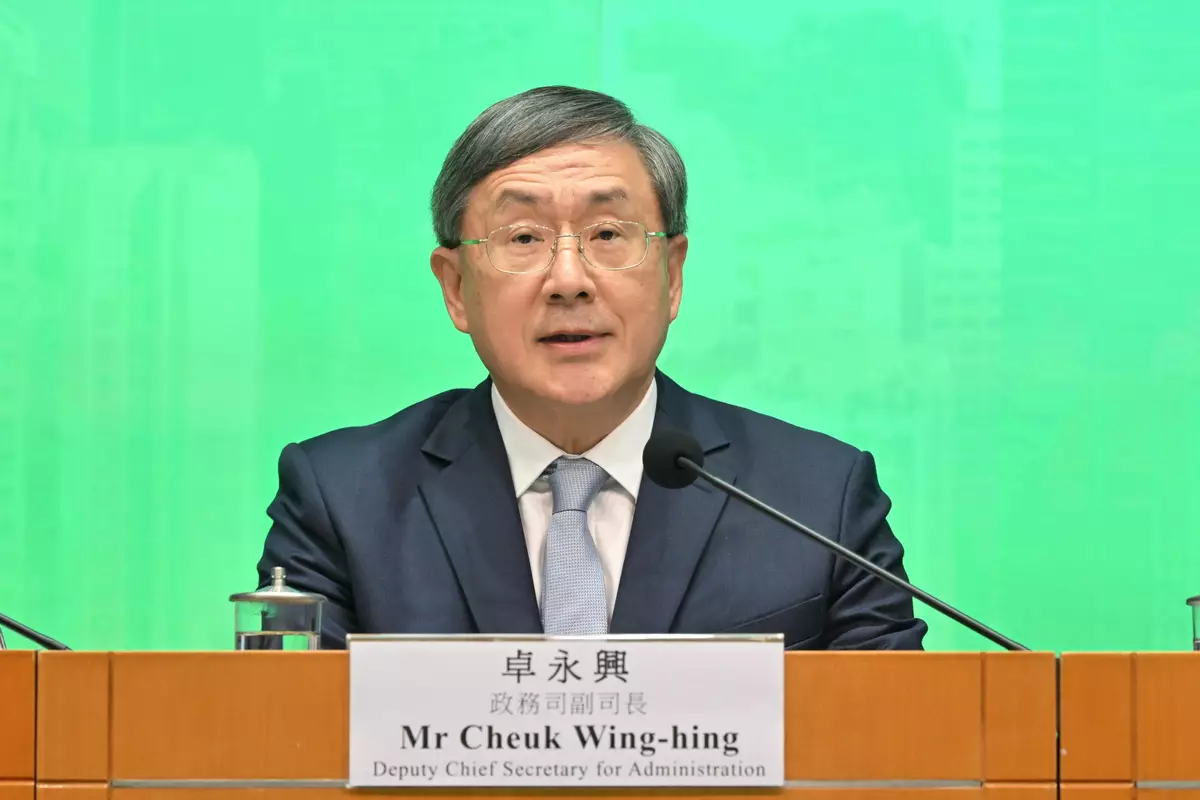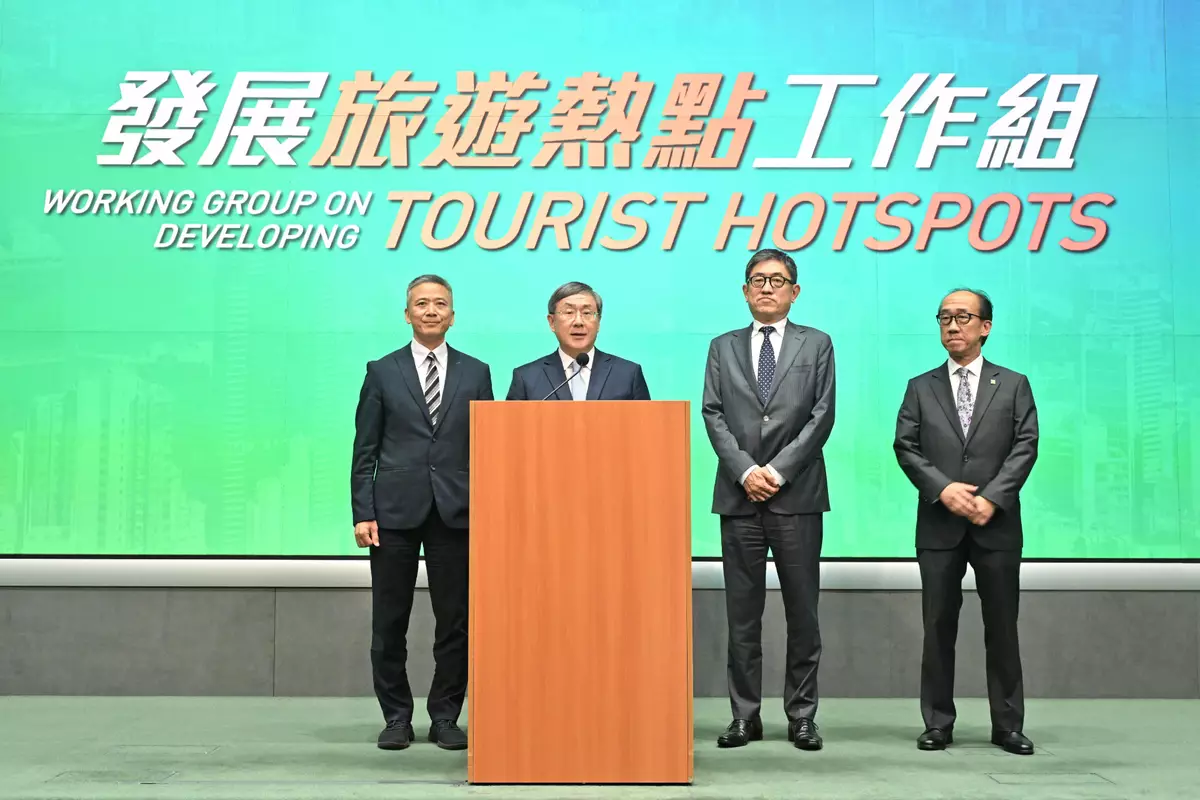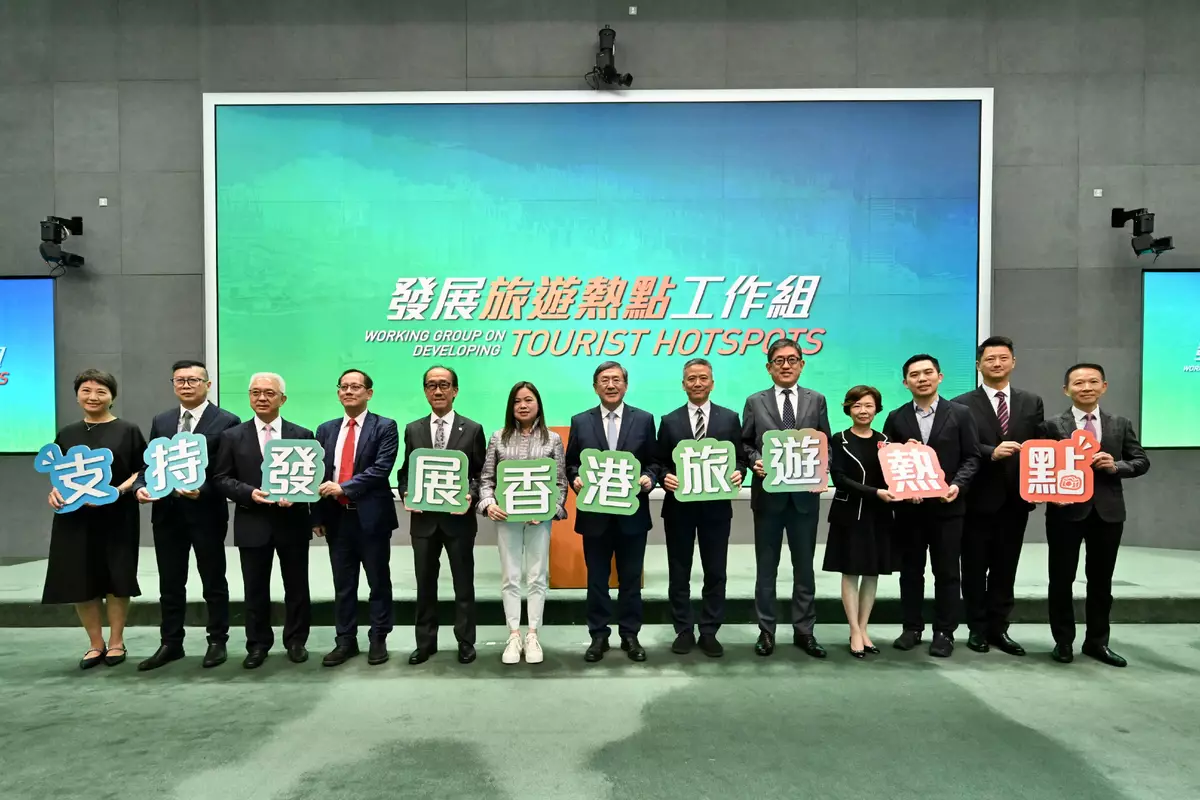Remarks at Working Group on Developing Tourist Hotspots press conference
The Deputy Chief Secretary for Administration, Mr Cheuk Wing-hing, held a press conference today (May 20) on projects to be implemented by the Working Group on Developing Tourist Hotspots together with the Secretary for Culture, Sports and Tourism, Miss Rosanna Law; the Under Secretary for Security, Mr Michael Cheuk; the Under Secretary for Home and Youth Affairs, Mr Clarence Leung; the Under Secretary for Environment and Ecology, Miss Diane Wong; the Under Secretary for Development, Mr David Lam; and the Commissioner for Tourism, Mrs Angelina Cheung. Following are the remarks by Mr Cheuk and Mrs Cheung at the question and answer session:
Reporter: Given the popularity since the 2023 border reopening, why is the development of a hotspot like Kowloon City and Yau Ma Tei Police Station proceeding so slowly, particularly in light of the rapid emergence of new attractions favoured by Mainland netizens? And the second question is, are our licensed tour guides currently equipped to lead tours for the new plans, including the Four Peaks, museums, and the industrial brands? Does the Government anticipate a need of more guides, and what measures are in place to address this? And finally, can you please provide an estimate of the visitor arrival increase following the implementation of the nine plans? Thank you.
Deputy Chief Secretary for Administration: I will take your last question first. I have answered this question in Chinese, but I don’t mind repeating this in English. We are quite confident that the nine projects to be implemented will bring in a considerable number of visitors to Hong Kong, but I think you would understand that it is difficult to quantify this and put a figure on what additional number of visitors will come as a result of these nine projects. I think common sense will tell you that, these nine projects, seven of which will be implemented by the end of this year, will together considerably add to the overall appeal of Hong Kong as a tourist destination to overseas visitors and also visitors from the Mainland. I think in that sense, the projects will result in economic benefits to Hong Kong and will also benefit the industries involved, like the hotel industry, the catering industry, the retail sector, and the transportation sector as well.
As regards whether we are acting too slowly to put together some of these projects, I would like to remind you that the purpose, the role of our working group is really to co-ordinate the different new hotspot projects in Hong Kong, and co-ordination is not just assigning which department or which bureau to do what. Actually, it involves a lot of discussion, removal of obstacles. For example, the industrial brand visit – if you are in Hong Kong long enough, you know that hitherto there is no such visit in the industrial estates. We come up with this idea, and we have to make sure that the proposal sits well with the planned land use and the lease terms. Also, we have to get the support of the Hong Kong Science and Technology Parks Corporation. Also, we have to identify and get the agreement of the manufacturers who are interested, who are willing to join our scheme, and we also have to believe these manufacturers and the products are of interest to tourists. So actually, the co-ordination involves a lot of work. Also, after identifying a certain project, we need to go on a site visit and look at the feasibility of the site, whether including it as a tourist hotspot would involve an unduly long period of time, and whether the hotspot identified will suit the new pattern of travelling and the individual preferences of travellers. A lot of work is involved, so we certainly don’t think that implementing these projects – as I mentioned, seven of which will be rolled out by the end of this year – is taking too long a time.
As regards the other question about whether more tour guides will be required, I think some of the projects would involve the trade. For example, there is potential for the trade to provide local tours for the exploration of Central, the exploration of Kowloon City. Whether they need more guides, I think, really depends on how good the business is. I don’t know whether the Commissioner for Tourism has anything to supplement.
Commissioner for Tourism: Thank you. We are working closely with the Travel Industry Council of Hong Kong (TIC) and they are very supportive and interested in liaising with the tourist companies, and travel agencies to arrange tours. As regards the number of tour guides, we have about 5 000 registered tour guides now.
For the TIC, they are also actively liaising with the tertiary institutions to encourage more young people to join the trade. In addition, we are working as stated in the Blueprint 2.0 (Development Blueprint for Hong Kong’s Tourism Industry 2.0) that we are planning to introduce a scheme for special licences for those people who are not really doing the full tour guide job, but they are specialising in like eco-tourism or cultural tourism. For these tour guides, we are planning to introduce a special scheme and we are working with the TIC to work out the parameters. In addition, we learned from the travel trade that there may be a shortage of tour guides (who can speak) foreign languages, not just English or Putonghua, but foreign languages like Spanish or German or all these kinds of foreign languages. We have already worked with the TIC to introduce a scheme to let these people who know about the foreign languages to have a short tour guide licence. This scheme is very effective and we will continue to implement the scheme so as to increase the supply of foreign language tour guides for the trade.
(Please also refer to the Chinese portion of the remarks.)
Remarks at Working Group on Developing Tourist Hotspots press conference Source: HKSAR Government Press Releases
Remarks at Working Group on Developing Tourist Hotspots press conference Source: HKSAR Government Press Releases
Remarks at Working Group on Developing Tourist Hotspots press conference Source: HKSAR Government Press Releases
Remarks at Working Group on Developing Tourist Hotspots press conference Source: HKSAR Government Press Releases
Monthly gravidtrap index for Aedes albopictus mosquitoes for April remains at lowest level
The Food and Environmental Hygiene Department (FEHD) today (May 20) announced that the monthly gravidtrap index for Aedes albopictus mosquitoes in April was 1.2 per cent. The index in April remained at the lowest level, which is Level 1, indicating that the distribution of Aedes albopictus mosquitoes in the survey areas was not extensive.
In April, all 64 survey areas recorded a gravidtrap index level lower than the alert level of 20 per cent. Moreover, the monthly density index for Aedes albopictus in April was 1.1, which means that an average of 1.1 Aedes albopictus adult was found in the Aedes-positive gravidtraps, indicating that the number of adult Aedes albopictus was not abundant in the survey areas. The gravidtrap and density indices for Aedes albopictus in different survey areas, as well as information on mosquito prevention and control measures, are available on the department website atwww.fehd.gov.hk.
A spokesman for the FEHD said, “As summer is approaching, the FEHD reminds members of the public to carry out early effective prevention and control measures against mosquitoes as mosquitoes breed quickly in the hot and rainy weather. The Government has long been concerned about mosquito infestation. The FEHD has continued to intensify the mosquito prevention and control work with relevant government departments in areas under their purview, including eliminating mosquito breeding places, applying larvicides, conducting fogging operations to eradicate adult mosquitoes, and placing mosquito trapping devices at suitable locations. The FEHD has also conducted site inspections with relevant departments, and provided them with professional advice and technical support to assist them in formulating and implementing effective anti-mosquito measures swiftly. At the same time, the FEHD has strengthened publicity and education. Under the concerted efforts and collaboration of various parties, the index in April remained at a low level. The FEHD will continue to monitor the mosquito infestation in all districts, and will conduct prompt and effective mosquito prevention and control work. At the same time, members of the public are advised to continue the routine mosquito prevention and control work, especially the repair and maintenance of structures. Cracks and dents which may accumulate water and become potential breeding grounds should be filled and levelled to reduce the chance of mosquito breeding.”
The FEHD will conduct a three-phase Anti-mosquito Campaign this year. The second phase of the territory-wide campaign was launched on April 14 and will run until June 13. During the period, the district offices of the FEHD will target areas that have drawn particular concern, such as public markets, cooked food centres and hawker bazaars, single-block buildings, streets and back lanes, common parts of buildings, village houses, construction sites, vacant sites and road works sites to remove accumulated water and carry out mosquito prevention and control work. To further enhance the effectiveness of mosquito control, the FEHD and relevant government departments have carried out phase two of the All-out Anti-mosquito Operations from May 7. In addition to the work of phase one, including eliminating potential mosquito breeding places, the FEHD called on property management entities to arrange for necessary repairs to their premises to minimise mosquito breeding places and commence adult mosquito control measures by means of regular ultra-low volume fogging operations.
The FEHD appeals to members of the public to continue to stay alert and work together to carry out mosquito prevention and control measures early, including inspecting their homes and surroundings to remove potential breeding grounds, changing water in vases and scrubbing their inner surfaces, removing water in saucers under potted plants at least once a week, properly disposing of containers such as soft drink cans and lunch boxes, and drilling large holes in unused tyres. The FEHD also advises members of the public and estate management bodies to keep drains free of blockage and level all defective ground surfaces to prevent the accumulation of water. They should also scrub all drains and surface sewers with an alkaline detergent at least once a week to remove any mosquito eggs.
Aedes albopictus is a kind of mosquito that can transmit dengue fever (DF). DF is commonly found in tropical and subtropical regions of the world, and has become endemic in many countries in Southeast Asia. In 2024, the World Health Organization recorded over 14 million DF cases, which was a record number. The dengue activity in neighbouring areas has remained high. Members of the public should stay vigilant and continue to carry out effective mosquito prevention and control measures.





